 Petzlover
Petzlover Both American Polydactyl and Cheetoh are originated from United States. Both American Polydactyl and Cheetoh are having almost same weight. Both American Polydactyl and Cheetoh has same life span. Both American Polydactyl and Cheetoh has same litter size. Both American Polydactyl and Cheetoh requires Low Maintenance.
Both American Polydactyl and Cheetoh are originated from United States. Both American Polydactyl and Cheetoh are having almost same weight. Both American Polydactyl and Cheetoh has same life span. Both American Polydactyl and Cheetoh has same litter size. Both American Polydactyl and Cheetoh requires Low Maintenance.
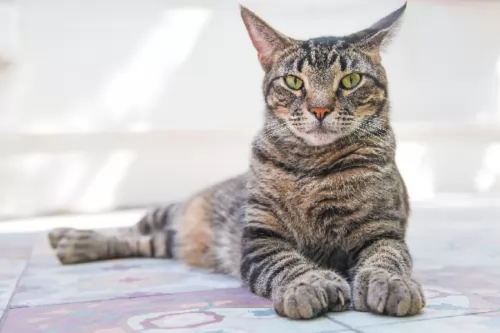 It is believed that this unusual cat came to the United States on ships – kept by sailors who thought of them as a good luck charm and to keep the mice population under control.
It is believed that this unusual cat came to the United States on ships – kept by sailors who thought of them as a good luck charm and to keep the mice population under control.
These unusual cats became popular in the 1800s as ship cats but the cats soon began to be seen in port cities on the Eastern coast of the United States as well as Canada, and their numbers began to increase.
It is also believed these interesting cats were brought specifically to the Boston area.
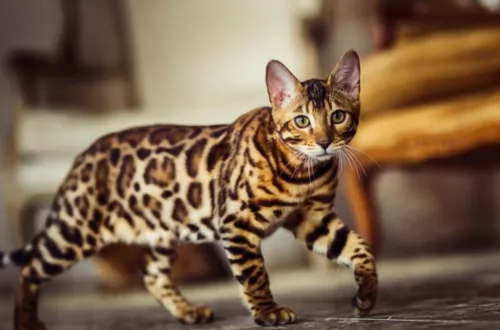 The Cheetoh is a beautiful cat whose parent breeds are the Ocicat and the Bengal.
The Cheetoh is a beautiful cat whose parent breeds are the Ocicat and the Bengal.
It was in 2001 that these two breeds were crossed by breeder Carol Drymon. Drymon was wanting to develop a new cat that would have characteristics similar to that of a wild cat but that would behave like a domesticated cat.
The Cheetoh became a recognized and registered breed with the United Feline Organization in November of 2004.
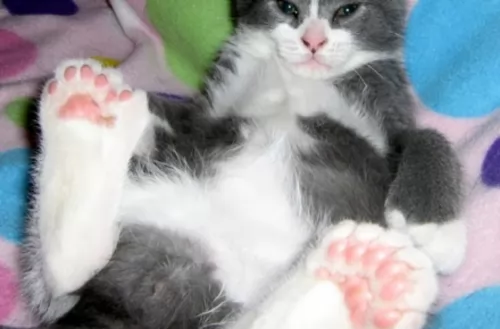 The Polydactyl cat is unusual in that the cat has been born with something odd about it. It has more than the regular number of toes on just one or more of its paws.
The Polydactyl cat is unusual in that the cat has been born with something odd about it. It has more than the regular number of toes on just one or more of its paws.
Normal cats have a sum of 18 toes, with 5 on the front and 4 on the back but with Polydactyl cats you may find as many as 9 digits on their front and back paws.
American Polydactyl cats are medium to large in size with strong, muscular bodies. The cat can weigh up to 6kg. The head is broad, the ears wide-set and pointed and the coat can be any color, pattern and length.
These cats are easy-going, relaxed, and social. They’re hardy too and they’re able to enjoy being outdoors and indoors.
They’re affectionate with their human family and are also playful and energetic. It is prepared to be friendly with dogs and children too, but it is also able to act independently and get on with things. The Polydactyl cat is distinctive but also a very popular cat breed.
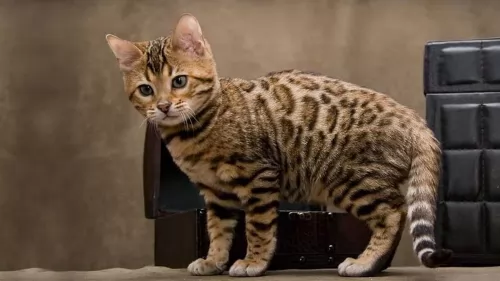 For a housecat, the Cheetoh is a muscular and large breed. In fact, this is one of the largest breeds of all the domesticated cats, with males being bigger than females. They can weigh anything between 7 and 10kg.
For a housecat, the Cheetoh is a muscular and large breed. In fact, this is one of the largest breeds of all the domesticated cats, with males being bigger than females. They can weigh anything between 7 and 10kg.
People want to own an animal that looks like a wild cat and the Cheetoh looks like a Cheetah. The coat of the cat can be several different colors and can be in different patterns with spots and stripes. He gets the spots from both the parent cats - the Ocicat and the Bengal. He definitely getd the longer legs from the Ocicat.
The purpose of the Cheetoh breeding program was to create an exotic, intelligent cat with a wild look and that would also be larger than your regular domestic cat. You could say it's the cats wonderfully soft, a velvety coat that makes it such an attractive cat.
Also, another notable feature with the cat is the way it walks - it looks as though it is stalking and prowling.
The cats are bred in 6 colors referred to as the black- or brown-spotted sienna, the black-spotted smoke the black- or brown-spotted gold, the black-spotted silver and the gold-spotted.
Your fascinating Cheetoh is a fun-loving cat, being playful and energetic and he will require a large yard and require being exercised.
They’re gentle cats but are talkative, being quietly friendly and social.
They make great family pets. They become devoted to their human family, being loyal and companionable. He is an affectionate, loving cat and his intelligence allows him to learn some simple commands and tricks.
He is the kind of cat that will do well in a family with kids and pets as he loves playfulness and fun, but he also wants to receive lots of love and attention.
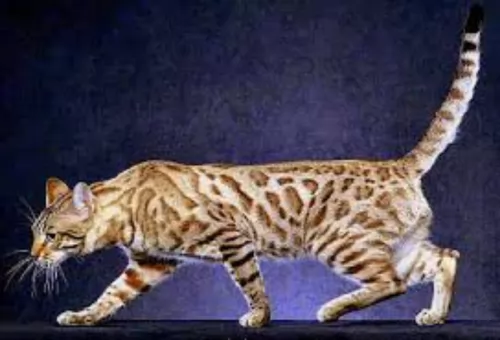 Cheetohs are a wonderful breed of cat and will love a busy household of adult humans, kids, and other pets.
Cheetohs are a wonderful breed of cat and will love a busy household of adult humans, kids, and other pets.
Remember that because of their wild side they have a high prey instinct and might like the idea of going after your small pets such as fish and birds.
Intelligent and playful you will need to keep your Cheetoh entertained and exercised with both mentally and physically stimulating puzzle-type games. One thing is for sure, with a Cheetoh in your home, you're never going to have a dull moment.
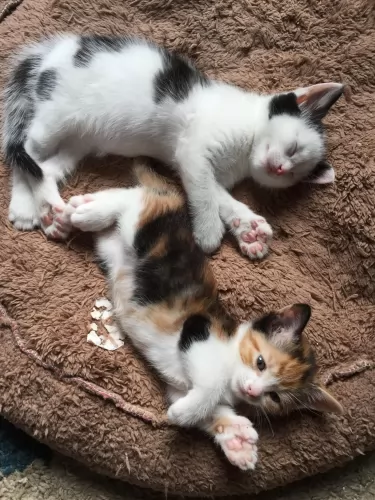 With good care, these cats can live to be between 14 and 16 years of age. You need to be diligent with keeping this cat’s nails trimmed because depending on the placement of the toes, the nails could become a nuisance, growing in the wrong direction and cutting into he cat’s flesh.
With good care, these cats can live to be between 14 and 16 years of age. You need to be diligent with keeping this cat’s nails trimmed because depending on the placement of the toes, the nails could become a nuisance, growing in the wrong direction and cutting into he cat’s flesh.
Keep the nails trimmed as necessary. To avoid possible injury to your pet, your veterinarian can safely trim your cat’s claws.
Always pay attention to your cat's behavior as well as taking note of your cat when you groom him as both are good ways to discover whether anything is amiss with your polydactyl cat.
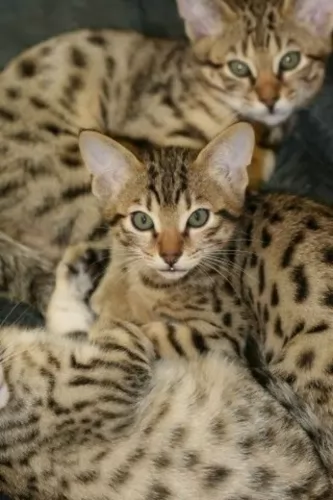 Whenever you buy a pet, particularly an exotic type of pet where you’ve spent a lot of money, make sure to check out potential health issues from the breeders.
Whenever you buy a pet, particularly an exotic type of pet where you’ve spent a lot of money, make sure to check out potential health issues from the breeders.
Always make sure to buy your cat from a reputable source to avoid health issues that could drastically shorten your Cheetoh cat’s life.
As with all cats, there are potential genetic problems in their ancestry that might reveal itself in your cat.
Certainly, if you suspect something is wrong, get your cat to the vet immediately.
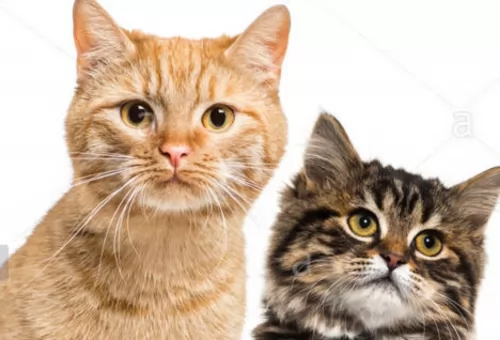 Keep an eye on your cat’s paws as their extra toes can make it that they are at a higher risk of hooking on a carpet or some other material, but this can be managed with regular nail trimming.
Keep an eye on your cat’s paws as their extra toes can make it that they are at a higher risk of hooking on a carpet or some other material, but this can be managed with regular nail trimming.
Provide your cat with all the things he needs to make his life pleasant while in your care. He’ll need feeding and drinking bowls, a nice warm, dry bed, a litter box, stimulating toys, and things such as a scratching post and cat climbing tree.
Cats are meat-eaters, and they need protein from meat for health. Some cooked chicken and beef can be a real treat for your pet. Grains and carbohydrates should only play a very small role in your pet’s diet. Too many grains can lead to malnutrition and obesity as well as problems with your cat's organs.
Always take into account your cat’s age because different life stages mean different energy levels and therefore different nutritional needs.
Take your sick cat to the vet when you see he is not his usual self. Make sure you keep up to date with all his vaccines and anti-parasite treatments.
One of the most important health decisions you’ll make for your Polydactyl cat is to have your pet spayed or neutered. The procedure is common and performed in your vet’s office every day.
It offers lifelong health benefits. It improves your pet’s behavior and keeps them close to home too. Spaying a female cat will prevent uterine infections and breast cancer, and for males, it can prevent testicular cancer.
Best of all, it helps to prevent yet more kittens into a world overrun with stray cats and rescue centers jam-packed with unwanted kittens and cats.
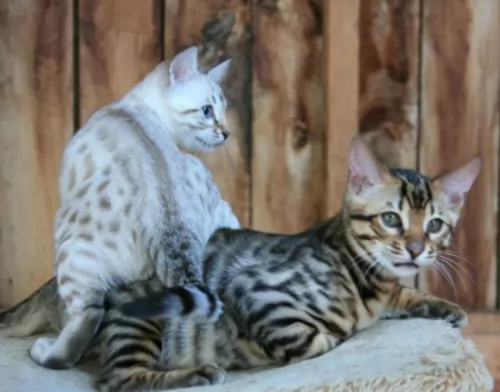 Although the Cheetoh is considered to be a hypoallergenic cat, no cat is really so, but nonetheless the coat is lovely and velvety and is shiny and short, being low shedding as well.
Although the Cheetoh is considered to be a hypoallergenic cat, no cat is really so, but nonetheless the coat is lovely and velvety and is shiny and short, being low shedding as well.
He will need lots of exercise, but luckily with his dog-like attributes, he can be taught to walk on a leash,
Ensure your cat has a nice dry, warm sleeping area.
These are energetic cats and he will need a complete commercially manufactured cat food that is high in protein, after all this is a carnivore and they require meaty diets.
If in any kind of doubt as to what to feed your Cheetoh, speak with your veterinarian if you have any concerns.
Make sure that your cat is never without a constant supply of fresh, cool water. A water fountain, with moving water, always encourages water drinking with cats.